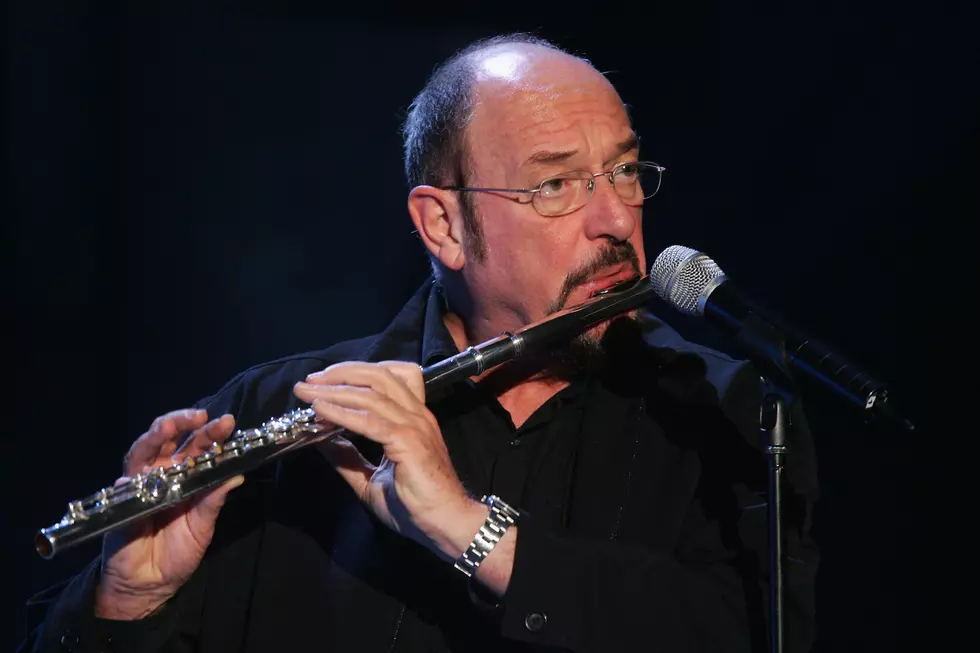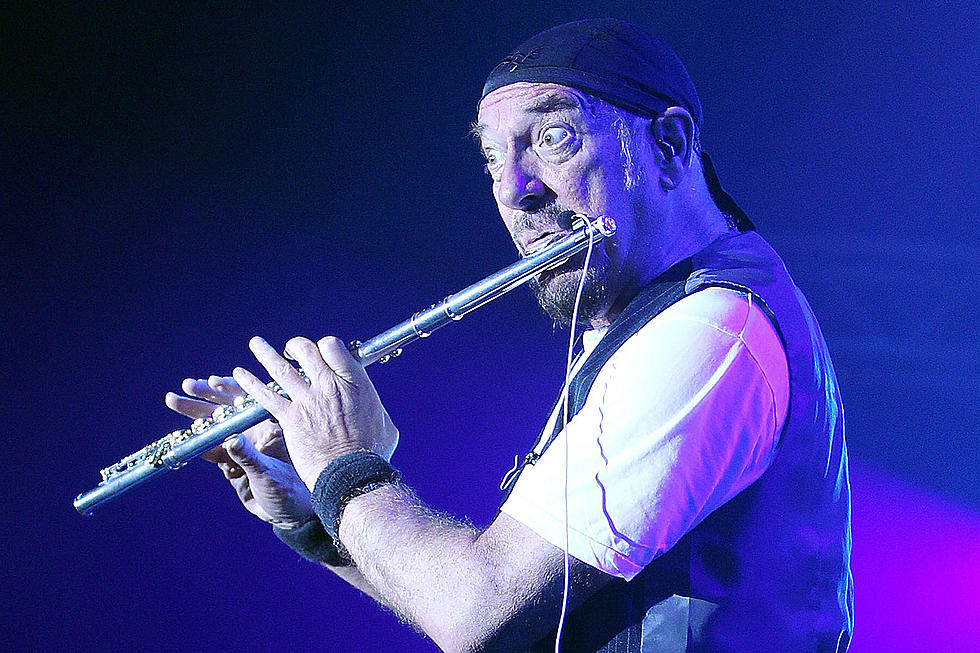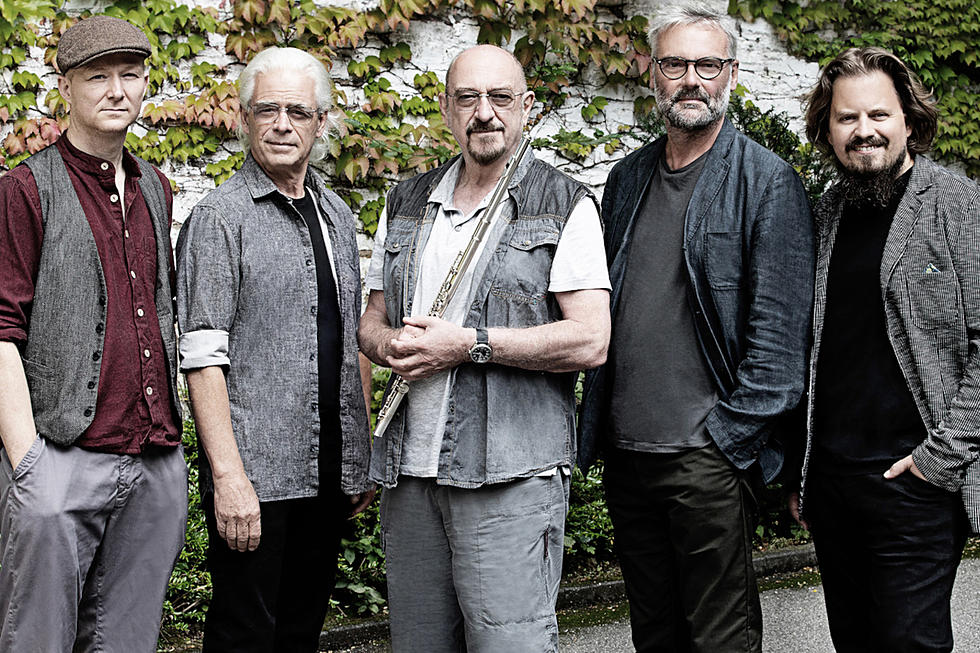
Ian Anderson Wrestles With New Jethro Tull LP’s Biblical Themes: Exclusive Interview
Ian Anderson: singer-songwriter, progressive rock icon, man of many words.
During a lengthy chat with UCR, questions often begin with obvious topics (songs from The Zealot Gene, the first formally billed Jethro Tull album in nearly two decades) and wind up with less expected subject matter (like Pope Francis and American politics).
Then again, Anderson is fond of sewing together random themes and sounds — evidenced yet again on The Zealot Gene, which uses the Christian Bible as a loose springboard into a set of intricate prog and intimate folk. We spoke to the Tull bandleader about this not-quite-conceptual album and just about everything else.
This album is loaded with Biblical allusions, but it's not exactly a concept album. How did that thematic thread develop? I particularly like the duality of “Where Did Saturday Go?”
All the songs on the album derive initially from one-word extreme emotions. I wanted to write an album of songs, each about a high level of emotion. I wrote a list of some good stuff: love, compassion, loyalty, tenderness – and bad stuff like rage, vengeance, greed. I wrote a list of maybe 12 different words. I looked at the list and thought, “Those are all words I remember reading in the Bible.” So I did an Internet search of the Bible for various reference incorporating those words and emotions. I copied and pasted some verses of text from the Old and New Testament and put them in a document as a constant reference point so I could take those as they appear in the Bible and use them very liberally translated into the modern real-life world today, with one or two exceptions. “Where Did Saturday Go?” is the lost day: It could be the lost day that you don’t remember because you drank too much on a Friday night. It could be the lost Saturday deriving from its Biblical reference of Good Friday, Sunday and Easter Monday, which is still a holiday. But Saturday is never mentioned, which struck me as particularly poignant — whether you believe in Jesus Christ, the Messiah, or if you believe, like I do, in the high probability there was a Jesus of Nazareth who was a slightly ballsy Jewish prophet who paid for his boldness with his life. But the awfulness of the crucifixion — it’s almost as if it took 24 hours to sink in with his followers. It’s that missing period we know nothing about.
I like it because it has so many parallels. We miss parts of our lives today, and we can’t really recall what happened on that day or in that period because we blocked it out or we were incapacitated. I’m toying and playing with things, which is I suppose what people like me get paid to do for a living. We fool around with notions and ideas – and some of them are notions of substance, and some of them are just frivolities.
Watch Jethro Tull's Video for 'Shoshana Sleeping'
I find these parallels fascinating, particularly as an atheist who grew up attending Catholic church.
I think what I get from religion, both Catholicism and Protestant Christianity as well as other religions, is that for me it’s a gateway. It’s one of many possible portals of an awareness of spirituality. I see the church as just being a door that you can stand outside and peep through a little bit and say, “Ah, that might be interesting. Maybe next time I come back I’ll actually go in.” You might go and say, “That’s OK. I don’t think I’m going to stay here very long, but I may come back and see what lies beyond.” I perform regularly in churches and cathedrals in support of raising funds for their upkeep and maintenance; it’s something I’ve been doing on a regular basis since 2004. It’s something that for me is a bit of a crusade every year — trying to find the delicate balance between a secular concert and observing the traditions and the spirituality of the Christian Christmas. I think I’ve managed to do that. I rather feel that I’ve got the hang of it. Sometimes when people ask me “What do you do?” I can say, “I’m an international rock star” or “I play flute in a rock band,” which then leans on into other stuff. It’s much easier to just say, “I work in the church,” which ends the conversation straight away. [Laughs.] I’ve slightly in jest proclaimed I’m a churchman by profession, and indeed for a few days a year that’s exactly what I am. But I do not call myself a real Christian.
To be a real Christian, you have to have faith – and faith implies certainty, and I don’t do certainties. I do probabilities, and I do possibilities. On an agnostic level, you might put me down as a six and a half out of 10, sort of moving toward the idea of belief. But I certainly couldn’t express certainty, and I don’t feel that I need to. I’m quite happy sitting on the fence. Being a professional fence-sitter suits me because I get to look to either side and weigh the arguments and possibilities. If I decide to get off the fence and go to one side or the other, it will be with due consideration and a little trepidation, but nonetheless, I’ll feel that I’ve thoughtfully made a decision. And when I’m ready to do it, I’ll do it. But in the meantime, it doesn’t bother me that people feel I’m uncommitted. I’m happy on the fence for the time being. I spend a lot of time reading and thinking about the philosophical nature of religious history and comparative religion. I try to read about other religions and understand something of their background from early paganism beliefs to the great narrative of the Christian church, which is to its great advantage that it tells a story in a way no other religion does. Christianity is a story we can relate to, and it’s a great story: It’s got a beginning, a pretty heavy-duty development in the middle part; and the ending would seem to be a mixture of tragedy and joy, with a promise of something more to come – like it’s series three on Netflix. That’s what Christianity offers you: the promise of a series three, in Biblical terms.
Jesus Christ, Jesus the Messiah, I have a little problem with. Jesus of Nazareth, the historical character — I feel pretty convinced that he did exist and largely did most of what is attributed to his mid-life in the Bible. That bit I thoroughly appreciate, and it stands very firmly as an uplifting reference point for life. I’m certainly not an atheist, but I suppose my beliefs life somewhere [around] deism — belief in a single entity, a god, but not a god you can identify or make a picture of or personify in human terms, something that looks like a nice old man with a big, flowing white hair and beard. That I don’t go for at all.
It seems like with every interview I do, there’s a new shift in the touring landscape: postponements, cancellations, new shows. Now we have the Omicron variant to deal with. How have you been handling everything?
We were able to 20 shows from the end of August through [mid-December] when I came back from the Vatican Christmas concert in Rome as a guest appearance. We did salvage 20 shows out of an otherwise very bad year — an almost non-existent previous year. But I was not very optimistic about dates going ahead in January/February of next year because we would almost certainly see a considerable rise in cases and potentially government restrictions coming into place in different places — different cities, different venues. [As of this writing, Jethro Tull's "The Prog Years" tour will relaunch on Jan. 21 in Umea, Sweden.]
But the omicron variant has been so rapid in its increases in national infection rates, even in the U.S., where I believe it’s now become the dominant variant, having ousted Delta from its prized possession. And in Europe, it’s running away much faster. ... So it's a great cause for concern, and we in the music industry generally are just accepting the fact that we’re living in a new world. Things aren’t the way they used to be, and there’s no point in pretending that they are. [For example, there's] the immense amount of extra work that goes into planning tours and having to cope with ever-changing regulations and entry requirements such as vaccinations and health certificates and COVID certification — tests before you go, tests when you get there, tests to be able to go back to the U.K., tests in the U.K. when you’ve been back for 24 hours or whatever. I had six COVID tests between Monday and Friday last week — six COVID tests to go and do this show in Rome.
Watch Jethro Tull's Video for 'Sad City Sisters'
That sounds pretty tedious.
It gets a little tedious, I have to say, but it’s the real world. Those who whine and moan about being vaccinated or having to show vaccination certification or test certification, I think, are the same sort of people who, 40-odd years ago, might have whined and moaned when they got into a car and were told they had to put a seatbelt on — or those who would be upset if they were told they couldn’t smoke in a restaurant. You have to accept that the world is a different place, and generally, we are there to fit into what become societal norms. If you don’t agree with them, well, I’m afraid you’re going to have to learn to adjust. In your country and in my country and in most of the countries in Europe, there are the anti-vaxxers who demonstrate loudly. And if they choose to not be vaccinated, that’s up to them, I agree that it is their right to refuse vaccination. On the other hand, if they get sick, ill and clog up hospital beds that are desperately in short supply and could be there saving other lives for other medical conditions, it’s hardly being a responsible citizen to refuse. Basically, we do have to learn that we owe it to each other to do what we have to do in what is an international emergency.
I accept it all, but I hate it. I hate wearing a face mask. I have to wear a face mask sometimes for eight hours continuously when I’m traveling – and having a beard, it itches, and it’s so damned uncomfortable. I wear a proper face mask: an FFP2 or FFP3 face mask to protect myself as well as other people. It’s claustrophobic and hard to breathe, but I do it. I feel constricted and uncomfortable wearing a seatbelt very often in a car, but I learned to do that back in the early 1970s when it became apparent that seatbelts were de rigueur everywhere we went. I remember having a huge argument with our drummer at one point, because he didn’t want to wear a seatbelt when he was sitting in the back of a vehicle, and he was sitting behind the rest of us in the back row. And I said, "Look, if we hit a wall, you are gonna come tumbling forward. You will probably die, but you may severely injure or kill somebody else who’s sitting in front of you. Please put your fucking seatbelt on!" I don’t think it’s unreasonable to make that request of people, that you do depend on each other for mutual safety.
Well, thanks for your time. I really do enjoy The Zealot Gene.
All the people who’ve interviewed me in the past few weeks have said, “I really like the album," and I start off by just thinking, “Well, they’re just saying that because they want to be polite.” And I appreciate the kind thought, but I don’t really believe them. But I’m starting to get the message that at least many of them really do think they like the album, and I have to say that scares the shit out of me. [Laughs]
Let me correct the record: I hate it.
[Laughs] The true answer should be, “It’s OK.” That’s what I sort of move toward with people. I like the idea that you do something and people think about it and say, “Yeah, yeah, that’s OK” – because there’s the scope of people to hardly dislike it or to grow into it more and find that you really, really do like it. As a general early reaction, I feel more comfortable with a cautious, moderate level of approval — as indeed half of North America gave to Joe Biden, as opposed to half the world embracing Barack Obama, as not only the president of the U.S. but a president for the Western world. That was a very special moment, but as many people with that degree of attention and power, he failed to satisfy ultimately. But Barack Obama’s Wikipedia entry 100 years from now will largely be a very positive one, unlike Mr. Trump or, unfortunately, Joe Biden, who is not showing signs of delivering something that the American people really need – especially the wavering Republicans, if there is such a thing. They’re not gonna be won over by Joe Biden.
Jethro Tull Albums Ranked
More From










